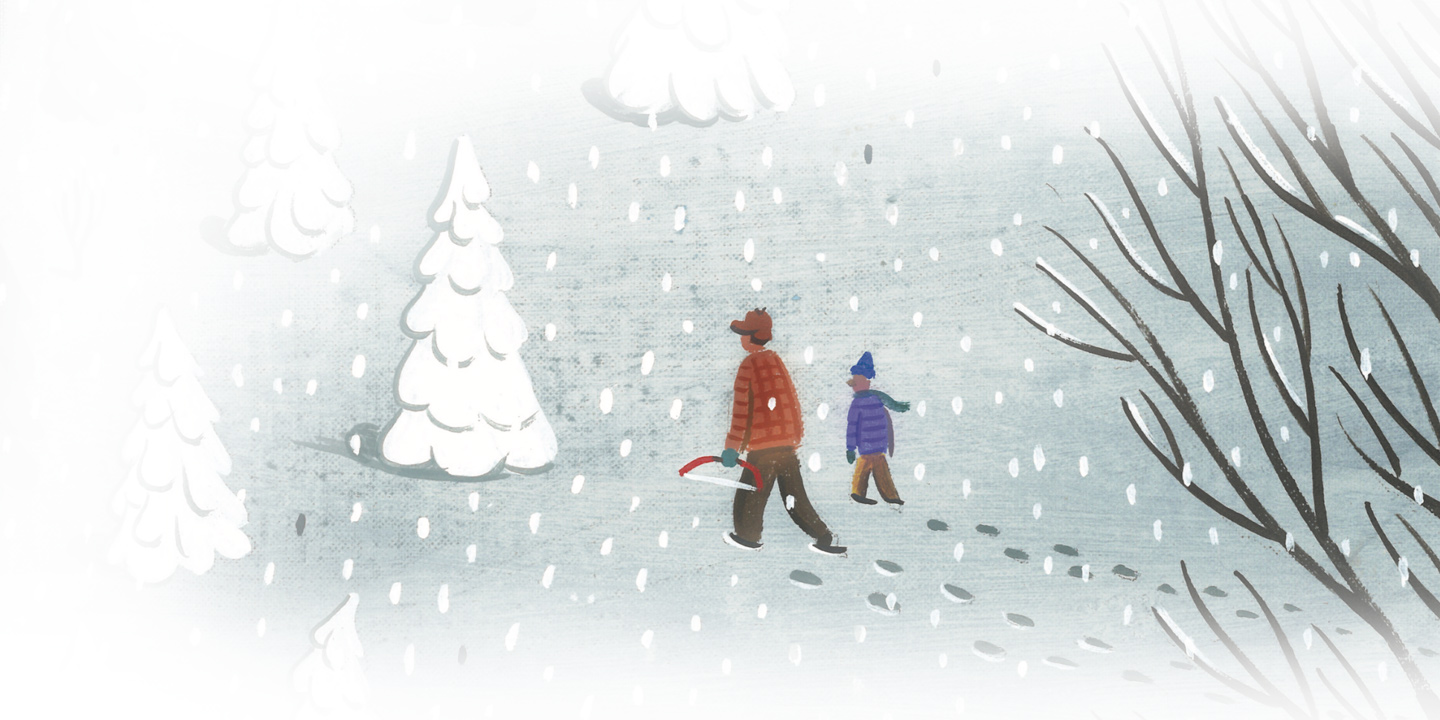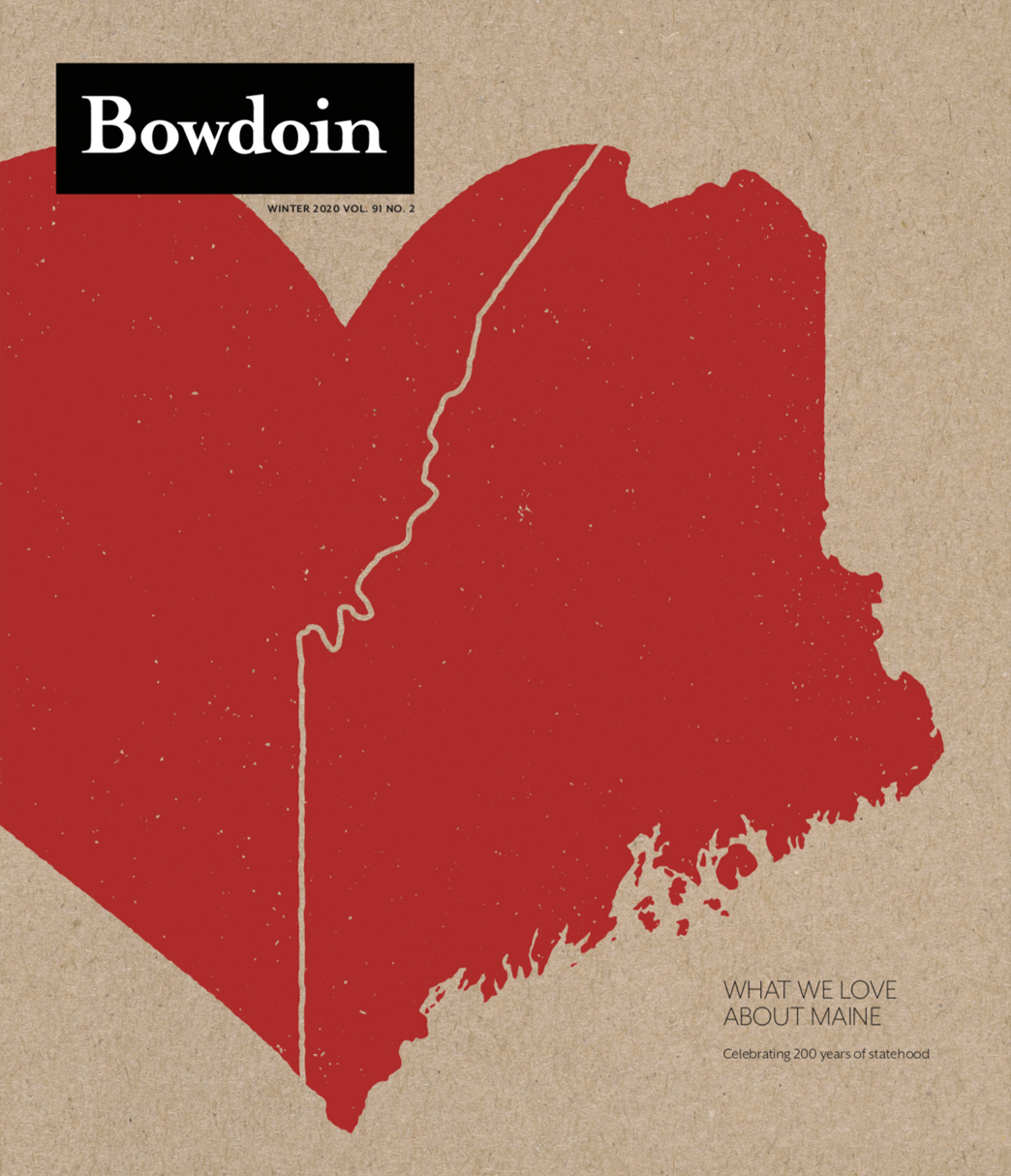Tree Cutting
By Jason Brown ’91The heater was broken in my grandfather’s Datsun, and there was a rusted hole in the floor between my feet where snow and sand from the road spurted up as if from an open blender.
I must have been about twelve, growing fast, and my rubber-bottomed boots were already too small. I felt my toes tingling as we crossed the Carlton Bridge heading east from Bath.
My grandfather and I were late to our task this year of chopping down a Christmas tree on MacMahan Island, where our family spent the summers. At the landing next to a lobsterman’s wharf, the old spruce formed towers of snow.
A thin layer of ice sheathed the seaweed at the shoreline. The island sat no more than half a mile across the passage. Steam poured out of the channel as if from a boiling pot and swept south around the tip of the island into the open water of the Sheepscot Bay.
My grandfather brushed off the aluminum boat that lay chained next to a tree. I took the other end and we shuffled to the water where I boarded first because I was the lightest; then the sled and my grandfather’s pack; finally my grandfather stepped into the bow and pushed us off.
At the island dock, my grandfather muckled the skiff to the cleat, and we set out. My grandfather trudged ahead, breaking snow as we passed cedar-shingled cottages. My feet were stinging now, as cold as the tip of my nose. They could sting for a good while before I had to worry, but I was already worried. Complaining to my grandfather would have been a betrayal not just of my grandfather but also of our ancestors who had come to Maine. My grandparents, who relished privation as a form of sacred communion with the past, often talked about them; the earliest, David Thompson, arrived in 1607 with the doomed Popham colony, who must have suffered more pain than I had ever known.
In the thickly wooded common land on the north end of the island, I lifted my legs high, and the snow clung to my wool pants. My grandfather grabbed the neck of a spruce. It was a healthy tree but a little flat on the backside. He shook the next one free of snow—too short. I shook a couple too, none of them just right. When my grandfather shook the trunk of an eight-footer, the limbs sprung loose from the snow and the air filled with cold white dust. The crystals settled on his face. “Not this one,” he said and reached out to shake the next tree and the next like a minister greeting his parishioners.

Finally, we found the perfect tree, a tall symmetrical cone. I brushed my glove over the needles, letting them snap back to form, and lowered my nose to inhale the sweet smell of spruce. In the summer there were other smells: the warm salt air mixed with moss, the rotting marsh, the stench of muck at low tide and bracken, now covered in snow.
My grandfather untied the saw and started on the trunk while I held the tree from above. When we laid the tree on the sled, I noticed the sawdust collected on the packed snow of our footprints.
For no apparent reason, my grandfather knelt and laid an ungloved hand on the ground. The skin of his face, blanched by the cold, tugged around his cheekbones. His blue irises were the only color in his face, and I saw, maybe for the first time, that he had once been my age.
For my grandfather, MacMahan was a perfected version of where he had spent his summers as a boy, on Squirrel Island near Boothbay Harbor just east of us. My great-great-grandfather Jacob Ham bought Squirrel Island with other investors and in the late 1800s transformed it into a summer colony for wealthy city people.
Squirrel was my family’s contribution to “Vacationland.” Jacob Ham grew up on a farm in the days before Vacationland existed. Later he became a grain merchant and eventually the first mayor of Lewiston, where my family had settled in the early 1700s during the bloody struggle with the French and native people to determine who belonged in the Province of Maine.
In the summer I lived among summer people on MacMahan, though I did not feel that I belonged. The families there had money while mine did not. In the winter, I lived among non-summer people in Hallowell; I didn’t think I belonged there, either, in part because our family had lived out of state. As a child I was anxious about where I belonged, and later, when I left Maine for work, I became prone to nostalgia.
Nostalgia is, among other things, a form of forgetting disguised as recollection, often for the purpose of covering up a history we don’t want to face.
But nostalgia is also a mechanism by which we recover the past to give our lives shape and meaning. Our way of seeming to take back what has been stolen by time in order to fix it in amber.
On the way to the island dock, my nose twinged with woodsmoke from Fred Taft’s farmhouse, the only winter residence of the island. Fred, an old family friend, worked at the Bath Iron Works in the machine shop and crossed the channel every morning to go to work. The birches he had been cutting in recent weeks lay stacked in a neat pile. Pale tree stumps rose above the surface of the snow. Beyond Fred’s house a dark patch appeared on the open water—a north wind heading our way. We had to hurry if we were going to cross back to the mainland before the gust hit us.
I couldn’t feel the front of my feet. For the moment I was grateful that the aching had vanished. Once we reached the car, I would take off my boots and socks, wrap my hands around my toes, and wait for the pain to return.
Jason Brown ’91 is an associate professor of creative writing at the University of Oregon. His latest book is a novel in stories called A Faithful but Melancholy Account of Several Barbarities Lately Committed.
Pat Corrigan is an artist based in Portland, Maine, who makes paintings, drawings, illustrations, murals, and comics. His work has appeared in many publications, including The New York Times, the Los Angeles Times, and the Chicago Tribune, among others.

This story first appeared in the Winter 2020 issue of Bowdoin Magazine. Manage your subscription and see other stories from the magazine on the Bowdoin Magazine website.